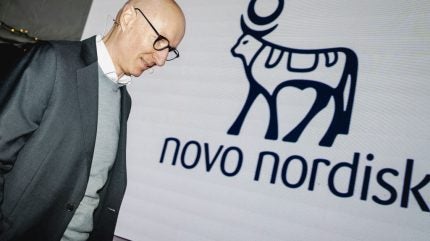
Novo Nordisk is parting ways with its CEO Lars Fruergaard Jørgensen after the two parties mutually agreed that a change of leadership was required amid fierce glucagon-like peptide 1 receptor agonists (GLP-1RA) market pressure from Eli Lilly.
It is a significant moment for the Danish company, which has been a major catalyst for the growth in the weight loss and type 2 diabetes (T2D) drug markets with its popular products Wegovy (semaglutide) and Ozempic (semaglutide), respectively.

Discover B2B Marketing That Performs
Combine business intelligence and editorial excellence to reach engaged professionals across 36 leading media platforms.
Shares in the Copenhagen-listed company dropped 4.3% at market close in the aftermath of the announcement on 16 May. Stock was still down by Monday morning (19 May).
Novo Nordisk did not provide a timeline for revealing its new CEO, saying only that the search for a successor is ongoing. Jørgensen will continue at the helm of the drugmaker to support a smooth transition to new leadership.
Despite early success, however, Novo Nordisk has fallen behind in the GLP-1RA race, overtaken by Eli Lilly and its GLP-1RA asset tirzepatide, respectively sold under the brand names Zepbound and Mounjaro for weight loss and T2D.
Novo Nordisk won the race as the first US Food and Drug Administration (FDA)-approved GLP-1RA with Ozempic in 2017, followed by Wegovy in 2021. Eli Lilly was never far behind, though, gaining approval for Mounjaro in 2022 and Zepbound in 2023.

US Tariffs are shifting - will you react or anticipate?
Don’t let policy changes catch you off guard. Stay proactive with real-time data and expert analysis.
By GlobalDataWhilst announcing Jørgensen’s departure, Novo Nordisk pointed to a market squeeze by rivals, without mentioning Eli Lilly by name.
“The changes are made in light of the recent market challenges Novo Nordisk has been facing, and the development of the company’s share price since mid-2024,” the company stated in a press release.
During an eight-year tenure, Jørgensen had helped steer the company to be one of the biggest drugmakers in the world. Novo Nordisk even became Europe’s largest company for a while, boasting a peak market cap of $604bn. However, dwindling share price meant the company lost its crown to German tech giant SAP in March 2025.
Shares in Novo Nordisk have fallen more than 50% – down to $66.15 from a high of around $133 – over the past 12 months as tirzepatide continued to show better clinical data than semaglutide.
In a head-to-head comparison between the two drugs, patients taking tirzepatide underwent 47% more relative weight loss than those taking semaglutide. It was a major win for Eli Lilly, giving the company a solid platform to advance into a dominant market position. Analysis by GlobalData in January 2025 demonstrated that tirzepatide was outpacing semaglutide in the obesity market, the former having a higher sales forecast by 2031. Last year, Eli Lilly’s sales grew 32% compared to 26% for Novo Nordisk.
“Considering the recent market challenges, the share price decline, and the wish from the Novo Nordisk Foundation, the Novo Nordisk Board and Lars Fruergaard Jørgensen have jointly concluded that initiating a CEO succession is in the best interest of the company and its shareholders,” Novo Nordisk added in a statement.
Novo Nordisk has also struggled with its next-generation GLP-1RA Cagrisema (cagrilintide/semaglutide), which produced disappointing Phase III data. The company has also slashed its 2025 forecast amid market challenges, both from Eli Lilly and the compounding sector. The company cut its sales growth to a range of 13%-21%, compared to earlier guidance of 16%-24%, as per its Q1 earnings report. Operating profit growth is forecast at 16%-24%, also down from a previous range of 19%-27%.




